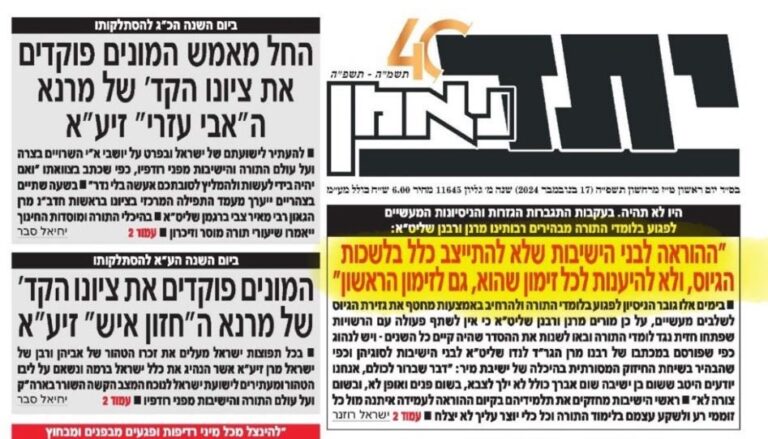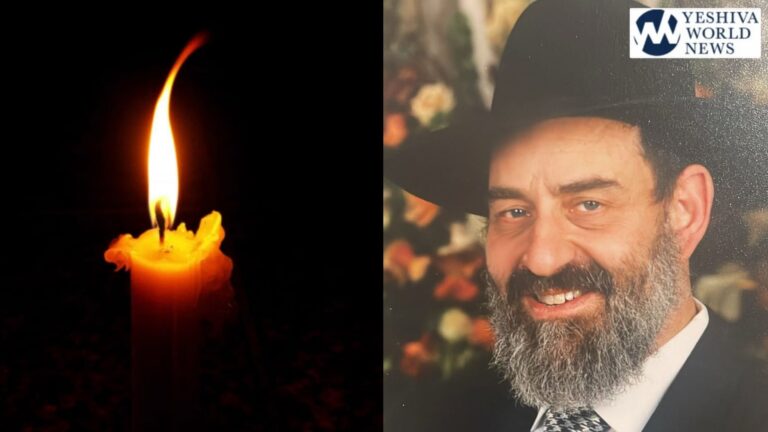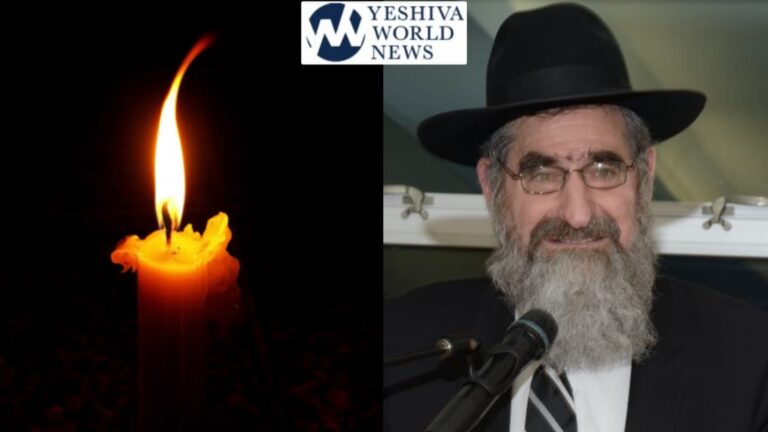 The headlines we see each day are grim. America has been hit by what is likely the worst financial crisis since The Great Depression, and the amount of frum families struggling with joblessness is staggering. Consider these numbers: Passaic, a community of approximately 1400 families, has seen 100 breadwinners lose their Parnassa this year. In Brooklyn, Rav Binyamin Eisenberger, the respected Rav of one of the largest shuls in Boro Park, said that, in his kehillah alone, 10 families were left without any means of support when their fathers’ jobs were cut. Tomchei Shabbos of Lakewood has seen the need for food packages rise to frightening proportions, with approximately 1 out of every 25 families receiving aid.
The headlines we see each day are grim. America has been hit by what is likely the worst financial crisis since The Great Depression, and the amount of frum families struggling with joblessness is staggering. Consider these numbers: Passaic, a community of approximately 1400 families, has seen 100 breadwinners lose their Parnassa this year. In Brooklyn, Rav Binyamin Eisenberger, the respected Rav of one of the largest shuls in Boro Park, said that, in his kehillah alone, 10 families were left without any means of support when their fathers’ jobs were cut. Tomchei Shabbos of Lakewood has seen the need for food packages rise to frightening proportions, with approximately 1 out of every 25 families receiving aid.
These are not just numbers.
They are our brothers, our sisters, our yiddishe kinderlach, struggling under the cloud of uncertainty: uncertain where the money to pay the grocery bill will come from, or the mortgage payments…uncertain if they will even have basic food to put on their tables. Once able to help others, they must now look to others to help them.
But what can be done? you ask. I’m barely managing myself, how can I help support another family at the same time…?
Yes, that is true. Alone, perhaps, we can’t support those who need our help – but together, we can ease the burden considerably.
This Shabbos, Parshas Beshalach / Parshas HaMan, has been set aside by our Rabbanim nationwide to make an Emergency Parnassa Appeal. Unemployment is across the board: Agudath Israel, The O-U, Young Israel, and other major Jewish organizations have all united to participate with the Emergency Parnassa Initiative to help Klal Yisrael.
“We’ve spoken with Agudath Israel branches all over the country, had meetings with the National Council of Young Israel, the Rabbinical Council of America, and the Orthodox Union,” Rabbi Zishe Novoseller, Executive Director of EPI, said earlier this week…we’re all in this together.” Along with COJO – the Council of Jewish Organizations of Flatbush and Boro Park – the allied organizations hope to turn the tide.
Begun at a discussion of ba’alei batim gathered at the Agudath Israel Convention, all of whom shared a desire to do something l’ma’aseh to help the situation, the Emergency Parnossa Initiative quickly gained momentum with a meeting with Novominsker Rebbe, Rav Yosef Rosenblum and Rav Aharon Schechter. A recent gathering of nearly one hundred Flatbush Rabbonim discussed how best to help the suffering mispallelim, with Rav Matisyahu Solomon, Mashgiach of Beth Medrash Govoha of Lakewood, urging for the Parshas Beshalach/Parshas HaMan Appeal.
The Appeal this Shabbos is just the first step of many to ease the pain of those who find themselves suddenly unemployed, with the funds your shul raises to be directed solely toward the mispallelim of your shul and community who have lost their jobs during the past year.
In Boro Park, Flatbush, and Monsey, a matching funds program has been set up, where every dollar donated equals two dollars given to each family every month. Other communities are encouraged to spearhead a similar program.
Stipends provide temporary relief; a job will provide a man with the means to support his family again. It is our responsibility to network at work, to inquire among our friends, and to seek contacts within our family in order to assist a fellow Yid in finding a new job.
In the Z’chus of our efforts, may we be Zoche to the Bracha of, “Kol HaMerachaim Al HaBrios, Merachamim Alav Min HaShamayim”.
(By: Chaya Fried for YWN)











28 Responses
The Emergency Parnassa Appeal is critical and I hope it is a huge success. In addition, we must look into training for new, in-demand, careers. They days are over of complimentary jobs by good people who were abundantly successful. We cannot drag our heals that parnassa is important but we dont want to put too much effort into caring about what we do for a living. Also, a new outlook should be impressed upon to our youth to do well in their secular study skill development so they are ready to take on good paying, professional jobs.
The Emergency Parnassa Appeal is critical and I hope it is a huge success. In addition, we must look into training for new, in-demand, careers. They days are over of complimentary jobs by good people who were abundantly successful. We cannot drag our heels that parnassa is important but we dont want to put too much effort into caring about what we do for a living. Also, a new outlook should be impressed upon to our youth to do well in their secular study skill development so they are ready to take on good paying, professional jobs.
So why do we still see so much luxuries in our Communities ? People (and not just the wealthy ones) spending 100’s of dollars for babies and children outfits ? Buying expensive fruits, etc. ?
Is it because so many have unlegitimate food stamps and section 8 ? It’s time to shape up, Yddelech.
to #1 (very interesting) – yashar koach! many in our communities have taken the ‘inyan’ of parnassah lightly, and have simply taken for granted that the money will always come from somewhere. sadly, our communities are now reaping what we have sown, with regards to the disdain (or de-emphasis at best) many of us/our mosdos show towards secular studies & higher education. of course those with degrees/experience are suffering as well, however the current financial crisis is showing that we are doing our next generation a great disservice by under-preparing them for the realities of earning a livable wage in the real world.
Why don’t people instead of splurging on Simchas not help our brothers. Don’t tell me that they give Tziddukoh already. This is no excuse to waste money on luxeries. This money should be given out!!!
Tips Letoivas Hakohol.
Medical insurance is available by the government. The less you have, the more you’re qualified. Call NACHAS on 13 ave corner 48 st.
Also there is a FREE grocery store on Ave K between E. 29 st and Nostrand Ave.
If anyone else has some tips on this subject please let’s hear ’em.
Don’t forget today is Gimmel Beshalach.
There’s supposed to be a great segula to say Parshas Hamon (Shmois Perek 16) Shnayim mikro vechad targum.
Hatzlocho.
Spending on simchas actually stimulates the economy (if you shop only from frum people). The community wont “save” money by stopping to spent on lavish things because that actually helps the economy (unless your a communist).
What we need to do is only shop by frum people, but keep shopping or things will get from bad to worse
Re: The free grocery store on avenue K also known as the Chesed Store has been supported heavily by one individual for the last 4 years. This man is seriously ill and is actually having a chemo session as I write this. Unfortunately due to his cirumstances he has fallen behind and can no longer maintain the store the 6 days per week that it was open. The store is also in danger of closing altogether due to the fundraising shortfall. The patron has actually borrowed a large sum of money to keep it going. Currently the store is open Wednesday Thursday Friday and Sunday.
The “store” receives donated food products and some non food items from a variety of sources including some government food. All products are distributed free of charge. Currently over 1600 families use the store. The store is open to all like the Aishel of Avroham Avinu.
If you would like to help by volunteering or donating money, call Raffi at 917 861 7282.
Please be Mispallel for a Refuah Shelaima for Rephael Chaim Ben Chana.
By the way, according to the Rambam’s rules of Tzidaka, giving a job to another yid is a great mitzva. Also, patronizing Jewish stores and businesses helps as well.
Tfilah for Parnasah:
It is a special Segulah to recite Parshas HaMon today, Tuesday of the week of Parshas Beshalach. Some recite it every day following Tfilas Shachris.
There is a free download of it (Hebrew/English) currently at the Web site http://www.artscroll.com
I live in Israel. My wife cleans our floors and scrubs, we don’t have an ozeret, when my kids get married I scrape together dollars to buy a half-carat not-so-perfect diamond for the kallah. We shop with a little pull cart.
My American friends tell my wife, ‘What! A half carat! They’d laugh in your face in America!’ and, ‘A shopping cart is kasha l’shidduchim in Boro Park!’
Our chassanas cost 9 dollars a person for the food. Right. Not 19, and certainly not 90.
And you know what? We are perfectly happy and very satisfied sitting and learning and enjoying a fantastic life.
I’m sure American frum people are suffering. But the goal should never be to be American middle class and also frum. Forgetaboutit.
out of all the comments #11 is the real truth !
the selfish materialistic lives so many have lived are so opposite to the real JEWISH way of life . there are “golden calf” jews in every generation !
what we all should be saying is BARUCH HASHEM that world events are starting to make us see reality, discarding the materialism and start to focus on the REAL reason why we are alive – to SERVE HASHEM !
well done for speaking up “mr avreich man” !
You could also download the Parshas HaMon at www718insurance.com
The first thing we need to do is to patronize our Jewish brothers and sisters businesses. The more business they have, the more money they make the more frum people they can hire. The halachah is ‘Ad chomesh”, even to spend a little more to buy it from a yid!! We need to go out of our way to hire frum people, even at a higher wage than we could get a goy!! And we have to do it with a smile, and thank Hashem that we have a job and business to give to another YID!!
GOOD IDEA: DON’T LET MONEY RUN OR RUIN YOUR LIFE.
Of course u have to be careful but do what’s right & you will be allright!
We should realize that we have been living much better than our parents and grandparents, and we should start getting used to a lower standard of living.
Can someone post what organization to contact if they needed to discuss taking advantage of the funds raised for the parnassa appeal?
#11 is inspiring. If you missed it, go back and read it. (I’m not a big fan of having many people in kollel, but #11’s approach makes me far more sympathetic.)
We try our best to live below our means. We do not feel pressured to make our simchas as fancy as our neighbors, nor is our car as nice, and our children certainly don’t get every new gadget.
On the other hand, we live above our means in terms of paying tuition, and paying for lessons for our children. It’s definitely worth the trade off.
It’s a real shame that our society focuses so much on image – so many people feel a need to keep up with others. If someone won’t marry my children because they think we do not look sufficiently affluent, than all the better that we managed to avoid a shidduch with someone who has bad values.
#18:
If I understand the program correctly, you must go through your shul’s Rabbi to access any funds. This is a shul based initiative, not a general fund. Only the Rav can submit for a Mispallel in his shul, no one can access the money personally. The appeal this Shabbos is to raise the cash that will go only for people in that specific shul where the money was raised. In certain communities, matching funds are available, i.e. whatever money the shul raised will be matched, up to a certain amount.
#19, you said it. We must learn to live below our means. #11, you inspire us all.
This cannot be overemphasized: We must buy everything we can from jews. This will help their family stay above the line, and then they will pass it on to another jew.
A decent Parnasah is so important for Shalom Bayis (see Bava Metziah 59a).
Currently, so many Yeshiva Bochurim assume that the correct thing is for them to learn in Kollel indefinitely, without planning toward becoming the primary breadwinner of their future families. When they are simply unable to manage, and their Shalom Bayis is falling apart, they ask a Sheilah as to whether they are permitted to leave Kollel.
My dear brothers, please listen to someone who cares: this is not the way it’s supposed to be. Because the Kesubah requires the husband to support the family, which is the Derech HaOlam, the Sheilah should be asked the other way around. That is, Bochurim should be asking an impartial Rav for guidance as to whether and how they should be preparing to support their future families. The Sheilah should be whether it is appropriate for them to defer their Kesubah obligation (assuming their wife consents) and, if so, for how long.
Most Rabbanim are well-aware of the need for the husband to support the family. Many Roshei Yeshiva are aware of it too. It seems, however, that when anyone says anything that implies that most people (or even some people) should not be learning full-time, they are attacked by so-called kanaim (zealots). My assumption is that the kanaim themselves have a decent source of Parnasah, otherwise they would be too busy struggling to engage in acts of “zealotry.”
To #11:
Praytell, who is paying for your health insurance, tuitions, food, an army to protect you,
sanitation, etc? Yes, it is the hard working middle class people – many of whom are kovea itim latroah with much mesiras nefesh – the ones whom you just disparaged in your extremely insensitive and narrow minded post. Try thinking a little deeper and maybe have a little hakoras hatov for us. One would think that a person purportedly learning all day should realize that.
i’ve been in these matzavim before (of not having a job, etc.), and i find that these 5 things are what brought brocha to our lives:
1. give maaser
2. pay tuition (including hiring private tutors if needed)
3. be mechabed your wife
4. don’t be cheap on buying shabbos food
5. be mechaven at “פותח את ידך”, and don’t say it like it’s Ashrey 🙂
i’m not a big fan of “segulos”, but when you strain yourself and go the extra mile where it hurts, surely the Ribbono Shel Olam will pay back, especially when his Shlichim Ne’emonim – Chazal – have guaranteed it
#11 so tell me why there are so many people coming from israel for money to help them marry off their kids? Because there is a madness in israel that the parents have to give an appartment for their children otherwise they cant marry them off tell me is that right??!!
# 23 Sane:
There’s no ben Torah who ever took on a full-time job just so a tiny percent of his taxes should help the Avreichim, as you imply. Absurd. If he wanted to help the Avreichim he would have given them a direct contribution and spent more time in learning.
The point I’m trying to make is that there is a huge gain to be had in dropping off the middle class roller coaster and spending more time in learning. It’s really very pleasant. And if I don’t have so much money it really works out fine because none of my friends do either.
For example, in my shul they’ve started cutting out kiddushes after ufruff’s. It saves money and most of us cannot afford to pay for a huge Vort, Erusin, Ufruff, and Sheva Brachoshas when everybody’s coming to the Chasana anyway. Since we’re all doing it together it’s really nice.
#25 Amen the housing disaster in Israel is a big, big problem. With the recent doubling in apartment prices for charedim–not for anyone else!!–it’s getting impossible. People who never thought they would are renting. I just daven that the prices should drop back down to something reasonable…
as important as the parnosoh appeal is helping the people find solid jobs. not jobs that are jobs, but careers. 1 way is government positions, which are usually more secure than the avg jobs. This holds true on the state level, but more so on the federal level.
To #26:
You have totally missed the point! Obviously no one intentionally works to pay taxes. The point is that #11’s children do not go to Yeshiva for free -although he does not pay for it. I pay close to $50,000 a year in tuitions, aside from thousands to other mosdos and schuls to which I am connected. I find it incredible to believe that someone supposedly learning full time or part time, feels that since he does not spend much on a kiddush, he is so holy – and ridicules the guy is who is slaving away paying the avreich’s tuition bills, building funds, and etc.
As a by product, the same middle class worker also happens to be contributing taxes which do pay for the avreich’s other necessities in life. Is it so difficult to be makir tov? Why do you have to belittle? Your learning is meaningless if you are unable to be maki tov to the hand that feeds you. I hate to break it to you, but there are some people who feel guilty getting a fee ride in life and desire to pay there own way.
Avreich Man (311/#26):
You are a Tzaddik gamur and I would stand up for you if you walked into a room.